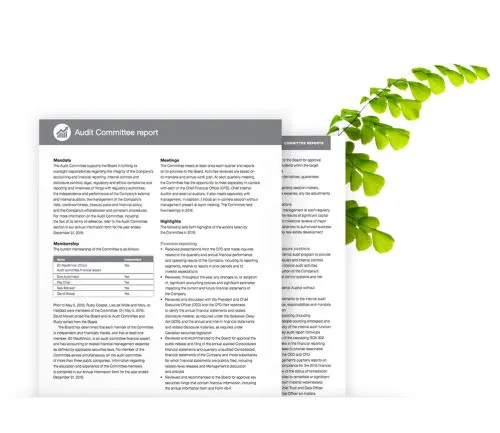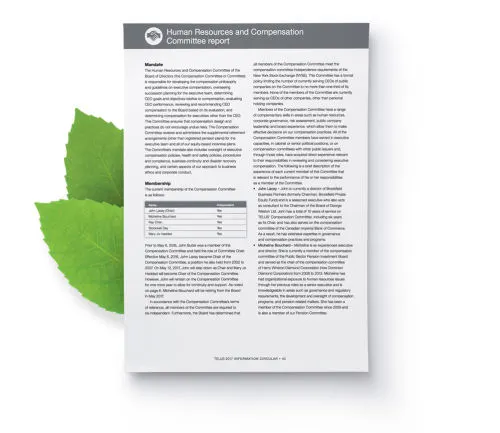Board policy manual

Board and committee mandates
The entire Board Policy Manual, including terms of reference for each committee, is now available for viewing.
Download the entire version of the TELUS Board Policy Manual or view the individual Appendices below. You will need the free Adobe Acrobat Reader in order to view the PDF files.
Audit Committee

The Audit Committee supports the Board in fulfilling its oversight responsibilities regarding the integrity of the Company's accounting and financial reporting. The Audit Committee monitors the Company’s internal controls and disclosure controls; its legal, regulatory, and ethical compliance and reporting; and the timeliness of filings with regulatory authorities. The Audit Committee reviews and assesses the independence and performance of the Company's external and internal auditors, and oversees and monitors the management of the Company's risks, creditworthiness, treasury plans and financial policy, as well as the Company's whistleblower and complaint procedures.

Download the full report of the Audit Committee from the 2023 Information Circular to read more about membership, meetings and highlights of the Audit Committee's activities.
For further detail, refer to Appendix E - Terms of Reference for Audit Committee from the Board Policy Manual.
Corporate Governance Committee

The mandate of the Corporate Governance Committee is to assist the Board in fulfilling its oversight responsibilities to ensure that the Company has an effective corporate governance regime. The Corporate Governance Committee is responsible for monitoring corporate governance developments, emerging best practices, and the effectiveness of our corporate governance practices. The Corporate Governance Committee is also responsible for identifying, recruiting, and recommending nominees for election as directors, providing ongoing education and development for directors, and overseeing Board and director evaluations.
The Corporate Governance Committee assesses and makes recommendations to the Board for its determination of the independence, financial literacy, financial expertise and accounting or related financial management expertise of directors, as defined under corporate governance rules and guidelines.

In addition, as part of its expanded risk oversight role, the Corporate Governance Committee is responsible for monitoring and reviewing insurance, claims and property risks, corporate social responsibility and environmental matters.
Download the full report of the Corporate Governance Committee from the 2023 Information Circular to read more about membership, meetings, and highlights of the Corporate Governance Committee's activities.
For further detail, refer to Appendix F - Terms of Reference for Corporate Governance Committee from the Board Policy Manual.
People, Culture and Compensation Committee

The People, Culture and Compensation Committee (Compensation Committee) is responsible for assisting the Board in developing the compensation philosophy and guidelines on executive compensation, overseeing succession planning for the executive team, determining CEO goals and objectives relative to compensation, evaluating CEO performance, reviewing and recommending CEO compensation to the Board based on its evaluation, and determining compensation for the Executive Leadership Team (all Executive Vice-Presidents (EVPs) who are appointed officers of the Company). The Compensation Committee ensures that compensation design and practices do not encourage undue risks. The Compensation Committee reviews and administers the supplemental retirement arrangements (other than registered pension plans) for the executive team and all of the Company's equity‑based incentive plans.

The Compensation Committee's mandate also includes oversight of executive compensation policies, health and safety policies, and certain aspects of the Company's approach to business ethics and corporate conduct.
Download the full report of the People, Culture and Compensation Committee from the 2023 Information Circular to read more about membership, meetings, highlights of the Compensation Committee's activities, and the Committee's report on executive compensation.
For further detail, refer to Appendix G - Terms of Reference for PCCC from the Board Policy Manual.
Pension Committee

The Pension Committee oversees the administration, financial reporting, and investment activities of six registered Company pension plans, any related supplemental retirement arrangements as mandated by the Board, and any related trust funds (collectively the Pension Plans).
The Pension Committee is responsible for reporting to the Board in respect of the actuarial soundness of the Pension Plans, the administrative aspects of the Pension Plans, our investment policy, the performance of the investment portfolios and compliance with applicable legislation.
The Pension Committee may, from time to time, recommend to the Board for approval, fundamental changes in the nature of the pension arrangement for any Pension Plan, and fundamental changes in the governance structure for the Pension Plans.

Download the full report of the Pension Committee from the 2023 Information Circular to read more about membership, meetings, and highlights of the Pension Committee's activities.
For further detail, refer to Appendix H - Terms of Reference for Pension Committee from the Board Policy Manual.
